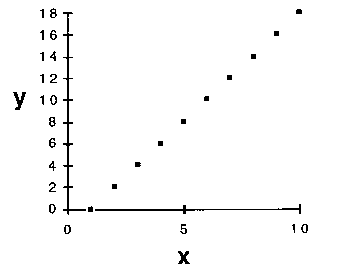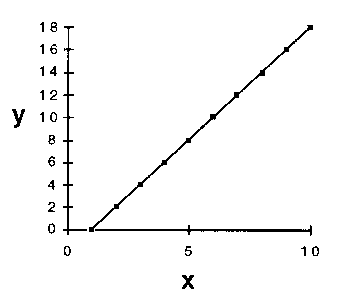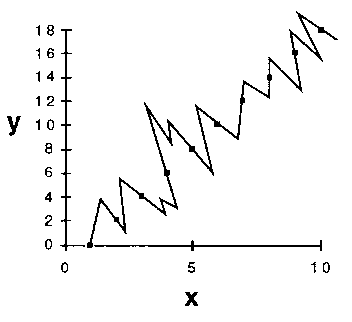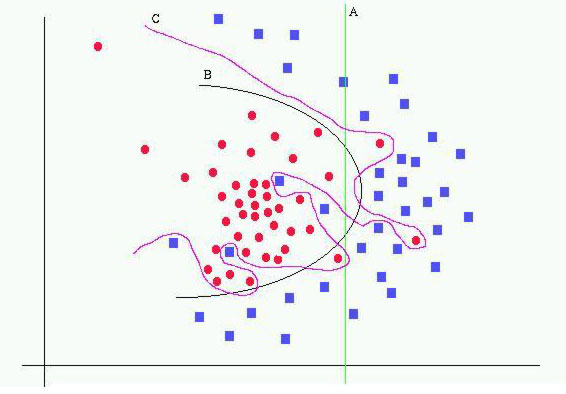Ockham's Razor / Occam's Razor / Principle of Simplicity
Ockham's Razor
Biography
- [Wikipedia, 2005]
William of Ockham (also spelled Occam) was living in the Middle Ages (ca. 1285–1349). He was born in England in a town called Ockham near Ripley, Surrey. William devoted to a life in extreme poverty and minimalism and lived as a Franciscan friar and philosopher. He became a pioneer of nominalism, the position in metaphysics, that there exist no “universals” outside of the mind. Besides he was theologian, an outstanding logician and concentrated on epistemology and modern philosophy in general. [Carroll, 2005]
In 1324 he was suspected of heresy by Pope John XXII and spent four years under house arrest while his teaching and writing were being investigated. During this time Ockham even concluded that the Pope was a heretic. After massive dissensions between the Franciscan order and the papacy William fled to Munich and sought the protection of Emperor Louis IV of Bavaria. He spent much of the remainder of his life writing about political issues, including the relative authority and rights of the spiritual and temporal powers. He died in a convent in Munich, Bavaria. [Hoffmann et al., 1997]
Definition
Though most of Ockham's principles are enrooted in philosophy, many approaches (especially the principle of Simplicity) can be found in the basics of design principles.
- Given a choice between functionally equivalent designs, the simplest design should be selected. Implicit in Ockham’s razor is the idea that unnecessary elements decrease a design’s efficiency, and increase the probability of unanticipated consequences. [Lidwell, 2004]
- When comparing technologies that perform the same function, a technology that is simpler in design will tend to be simpler to construct and repair, but will tend to require greater skill to use, whereas a technology that requires less skill to use will tend to be more complex in design and more complex to construct and repair. For example, a straight razor is relatively simple in design and construction, but requires considerable skill to use, whereas an electric razor is relatively complex in design and construction but requires little skill to use. [Omick, 2005]
Examples
Example 1:
This example shows two different types of data visualization after a series of measurements of a property y in its response to adjustment of a factor x, with following results:
Figure 1 - Some experimental measurements of a property y in response to variation of a factor x:
- [Hoffmann et al., 1997]
Figure 2 - A straight line fitted through the data points of the Figure above:
- [Hoffmann et al., 1997]
Figure 3 - An alternate fit of the same data points:
- [Hoffmann et al., 1997]
Aside from some intuitive sense that it just seems right, the degrees of freedom of the fits could be a more scientific reason following the subjects of Ockham to prefer the visualization shown in figure 2.
[Hoffmann et al., 1997]
Example 2:
One should not increase, beyond what is necessary, the number of entities required to explain anything.
Figure 4 shows three possible data sets. According to Ockham's principles data set B should be the best.
- [Hoskins, 2005]
References
[Wikipedia, 2005] Wikipedia-The Free Encyclopedia, William of Ockham, Last Updated at: November 03, 2005, http://en.wikipedia.org/wiki/Image:Occam.jpg
[Carrol, 2005] Robert Todd Carroll, Occam's razor, The Skeptic's Dictionnary, Created at: 2005, Retrieved at: October 24, 2005, http://skepdic.com/occam.html
[Hoffmann et al., 1997] Roald Hoffmann, Vladimir I. Minkin, Barry K. Carpenter, Ockham's Razor and Chemistry, HYLE--International Journal for Philosophy of Chemistry, Vol. 3 (1997), Retrieved at: October 24, 2005, http://www.hyle.org/journal/issues/3/hoffman.htm
[Lidwell, 2004] Lidwell William, Universal Principles of Design, Created at: January 21, 2004, Retrieved at: October 24, 2005, http://www.visualgui.com/index.php?p=1
[Omick, 2005] David Omick, Living outside the box, A Few Simple Technologies for Daily Living, Design Considerations, Last Updated at: August 08, 2005, Retrieved at: October 24, 2005, http://www.omick.net/design/design.htm
[Hoskins, 2005] Peter Hoskins, Hoskins, Created at: July 28, 2005, Retrieved at: October 24, 2005, http://peterhoskins.typepad.com/tailwhip/2004/11/




